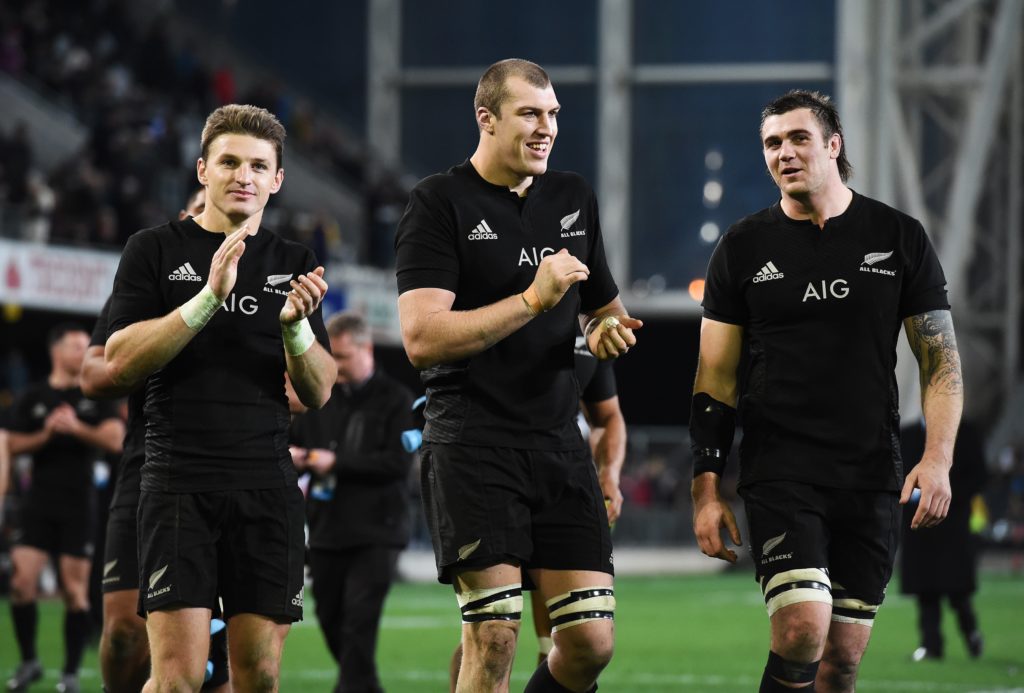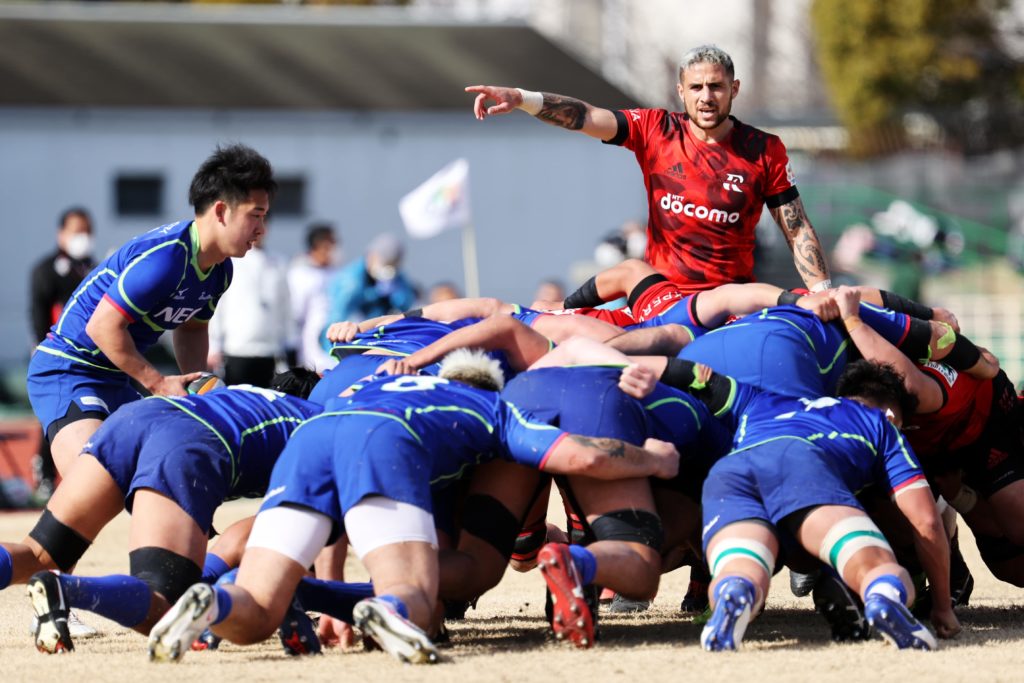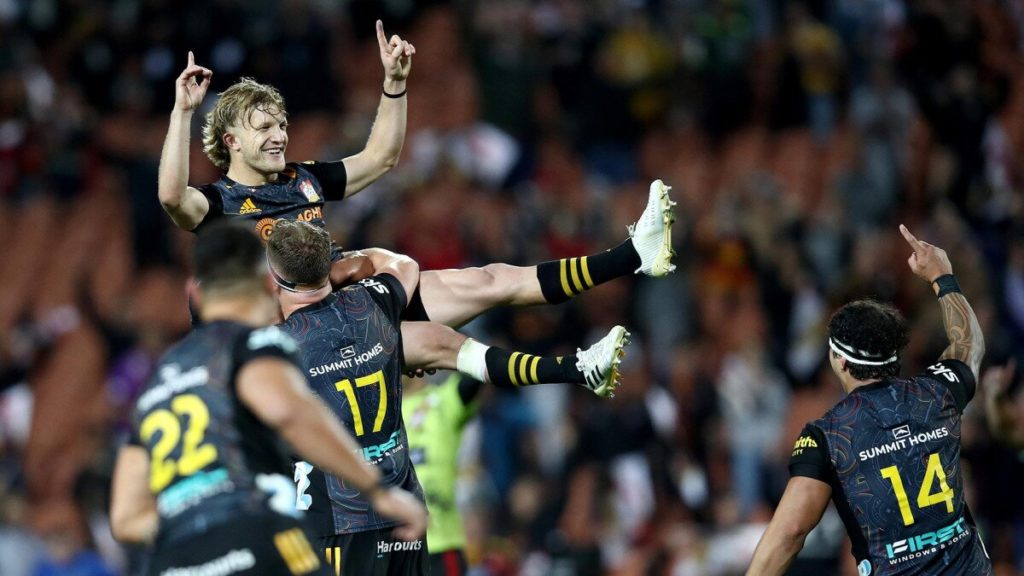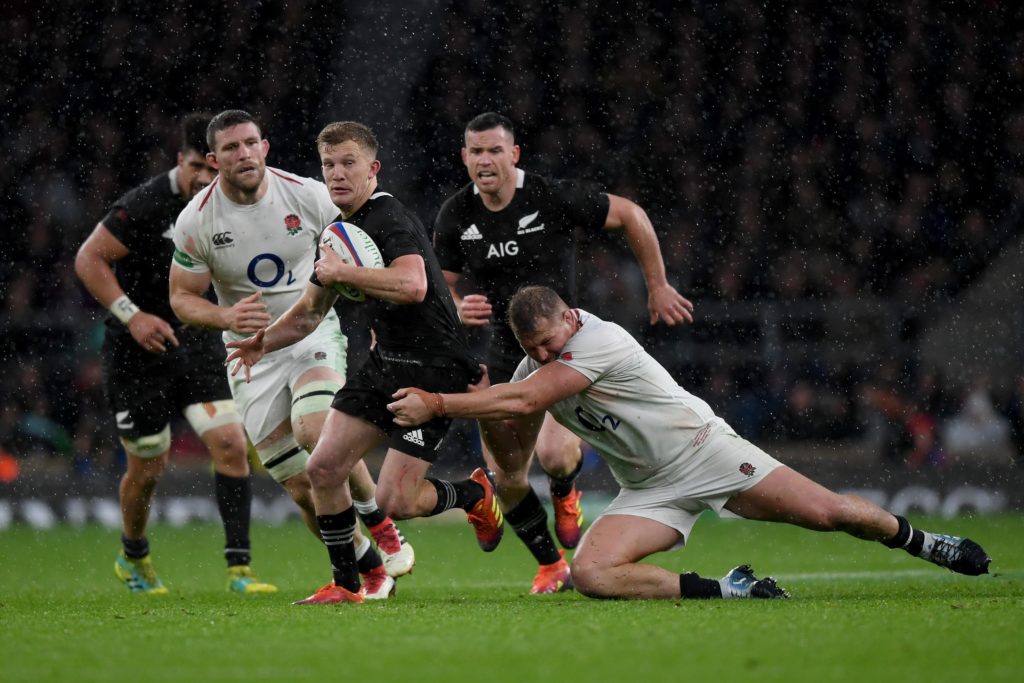If the rumours are to be believed, Damian McKenzie could be heading to Japan at the end of the year.
The 26-year-old playmaker is in the final year of a three-year contract with New Zealand Rugby and is reportedly considering a shift offshore – though is also likely to return home following a one-season deal to continue his exploits with the Chiefs and All Blacks.
McKenzie wouldn’t be the first high-profile New Zealander to take up such a deal.
The likes of Luke McAlister, Jerome Kaino and Matt Todd all spent time overseas after earning their All Blacks debut, only to return to NZ and pick up where they left off.
More recently, top players such as Brodie Retallick and Beauden Barrett have included sabbatical options in their contracts with NZR, which have allowed them to head offshore during the Super Rugby season but slot right back into the All Blacks upon their return to the country.

Whether that option would be available to McKenzie is up for debate.
Retallick and Barrett are both former World Rugby Players of the Year and have commanded selection in the national side since they first broke into the team in 2012.
Before heading to Japan, Retallick had notched up 81 appearances and 67 starts for the All Blacks. Barrett was in a similar boat, chalking up 89 caps and 58 starts in the black jersey before heading to Suntory Sungoliath at the end of the 2020 test season.
McKenzie, despite all his talents, is not in the same tier as those two players.
With Beauden Barrett the first-choice fullback for the All Blacks in 2020, Jordie Barrett continuing to grow into the role for the Hurricanes and 23-year-old Will Jordan developing rapidly with the Crusaders, New Zealand is hardly short of depth in the No 15 jersey.
After breaking into the All Blacks during the 2016 season, McKenzie has played just 27 games for the team, including 17 starting appearances. Last year, he started just one test match.
Making a single appearance for the New Zealand national rugby team is an incredible achievement – let along 27 – but those aren’t the kind of numbers that will convince NZR that you deserve a sabbatical clause.
With Beauden Barrett the first-choice fullback for the All Blacks in 2020, Jordie Barrett continuing to grow into the role for the Hurricanes and 23-year-old Will Jordan developing rapidly with the Crusaders, New Zealand is hardly short of depth in the No 15 jersey. Add the recently recalled David Havili into the mix and it would be hard to argue that McKenzie is indispensable, no matter how talented the playmaker is.
An All Blacks side without Beauden Barrett or Brodie Retallick is a considerably less fearsome beast whereas an All Blacks side without Damian McKenzie has become the norm.
Rather than McKenzie taking a sabbatical option, it’s considerably more likely that the 26-year-old would have to follow the lead of the recently returned TJ Perenara, who left for Japan before agreeing a new contract with NZR and found that he wasn’t eligible for selection in any national sides upon his return.

While Barrett and Retallick have been rushed straight back into the All Blacks squad for their July tests with Tonga and Fiji, halfback Perenara is currently turning out in the No 10 jersey in Wellington Club, and will only become available for the All Blacks once he’s played a game in the upcoming NPC.
That’s not a huge negative in of itself. Perenara likely commanded a similarly sized salary upon his return to NZ than he would have had he arranged a deal in advance. While he’s not able to play test rugby right now, his income won’t have been impacted and he’s undoubtedly enjoying himself running around at the grassroots level, a luxury that few top professionals are actually afforded nowadays.
The cost to Perenara, however, is that while he’s slipping and sliding through the tackles of local club players on a Saturday morning, he’s losing ground in the All Blacks halfback race.
Brad Weber could well be afforded a first-ever test start against Fiji this July while Blues halfback Finlay Christie is set for his first stint with the team – and won’t easily relinquish his spot in the squad.
Perenara, for all his talents, is likely never going to surpass Aaron Smith as New Zealand’s top halfback. Despite some heat coming on from Antoine Dupont in the north, Smith is still the world’s best No 9 and is likely to hold that mantle until 2023 when he likely calls time on his professional career.
Even if a Beauden Barrett or a Brodie Retallick or a weren’t allowed straight back into the test side, you suspect the credit they’ve earned over the past decade would see them rocket straight back into the starting side once they were back available for selection. For your TJ Perenaras and your Damian McKenzies, however, there’s much more at stake.
There is one key difference between the two players’ situations, however.
Perenara, for all his talents, is likely never going to surpass Aaron Smith as New Zealand’s top halfback. Despite some heat coming on from Antoine Dupont in the north, Smith is still the world’s best No 9 and is likely to hold that mantle until 2023 when he likely calls time on his professional career.
Perenara is three years younger than Smith, but there are no guarantees that he has more years left in his career than his NZ rival and with Folau Fakatava quickly coming through the ranks, Perenara’s time with the All Blacks could also come to an end following the World Cup in France.
McKenzie, on the other hand, is in a slightly different boat.
While the Chiefs utility back isn’t the first-choice fullback in New Zealand and faces stiff competition on all sides, there’s every reason to believe that the 26-year-old could stamp down that role – especially given that’s the position he was in prior to rupturing is ACL part-way through the 2019 Super Rugby season.

It was on the 2018 end of year tour that Steve Hansen and his fellow All Blacks selectors seemingly decided that the dual playmaking strategy was the structure that would carry the team through to victory at the 2019 World Cup.
Despite heat coming on Beauden Barrett from a young Richie Mo’unga, Barrett was entrusted with the No 10 jersey – and McKenzie ousted Ben Smith as New Zealand’s first-choice fullback.
The pair combined for four of the All Blacks’ five tests on the tour to the Northern Hemisphere, with both playmakers sitting out the match with Japan – alongside the majority of their senior teammates.
McKenzie was the man who sparked the national side to life against England and played a huge role in the All Blacks getting home 16-15 at Twickenham, while he looked the most likely player to break the game open against Ireland on a cold and wet Dublin night.
Even in the final test of the year against the lowly Italy, Hansen persevered with the Barrett-McKenzie combination when many anticipated the All Blacks would trot out an experimental lineout. Hansen wanted the two playmakers to spend as much time together in the saddle ahead of the 2019 World Cup – and that meant employing both players on the park even when the opposition didn’t necessarily demand the All Blacks’ first-choice team.
He boasts natural fullback skills that Jordie Barrett doesn’t possess in his arsenal while he’s also got the playmaking ability that Will Jordan doesn’t have access to at this stage of his career.
That planning was all undone when McKenzie suffered a season-ending ACL injury playing for the Chiefs the following season, invaliding him from the World Cup – and even upon his return last year, he never quite regained the same acceleration and agility that made him a nightmare for defenders.
As such, he was afforded just one start for the All Blacks – after Beauden Barrett was a late scratching from the opening test of the year – and made bench appearances in three subsequent games.
This year, however, McKenzie has been back to his best for the Chiefs, whether he’s been tasked with operating from fullback or running the cutter in the No 10 jersey.
That experience at first five will have been invaluable for the 26-year-old and might advance his case for national selection, and there’s genuine reason to believe that McKenzie could become a world-class fullback for the All Blacks with an extended run in the No 15 jersey. He boasts natural fullback skills that Jordie Barrett doesn’t possess in his arsenal while he’s also got the playmaking ability that Will Jordan doesn’t have access to at this stage of his career.
He’s also just five caps away from cracking the coveted centurion status with the Chiefs.

As such, it’s worth asking whether now is really the best time for McKenzie to be considering a move offshore – even if it’s only a temporary one.
If he spends the 2022 season in Japan and isn’t available for immediate selection upon his return, that hands Jordie Barrett or Will Jordan a free run at the fullback jersey. Given both players’ trajectories to date, it’s hard to see either of them relinquishing the role once they’re given a proper taster.
At last week’s squad launch, McKenzie confirmed that despite being off-contract, he full intends to be playing test rugby for New Zealand next season.
“I’m coming back,” he said when asked if 2021 would be his last season with the All Blacks.
“I’ve been selected for this team, so I’ll be putting my best foot forward to do what I need to do this year and hopefully can come back next year.”
If he does head to Japan, however, then that might be taken out of his hands.
There’s more to life than playing for the All Blacks, of course, and McKenzie may see an overseas contract as simply too good an opportunity to turn down. Professional careers are short, after all, and players only have a limited number of years to put some funds away for the long futures ahead of them.
But while he shouldn’t be chastised for prioritising his future, there’s a very real chance that even a momentary shift offshore could be the rain shower that finally snuffs out Damian McKenzie’s All Blacks torch, right when it could be on the cusp of reigniting.


Comments
Join free and tell us what you really think!
Sign up for free